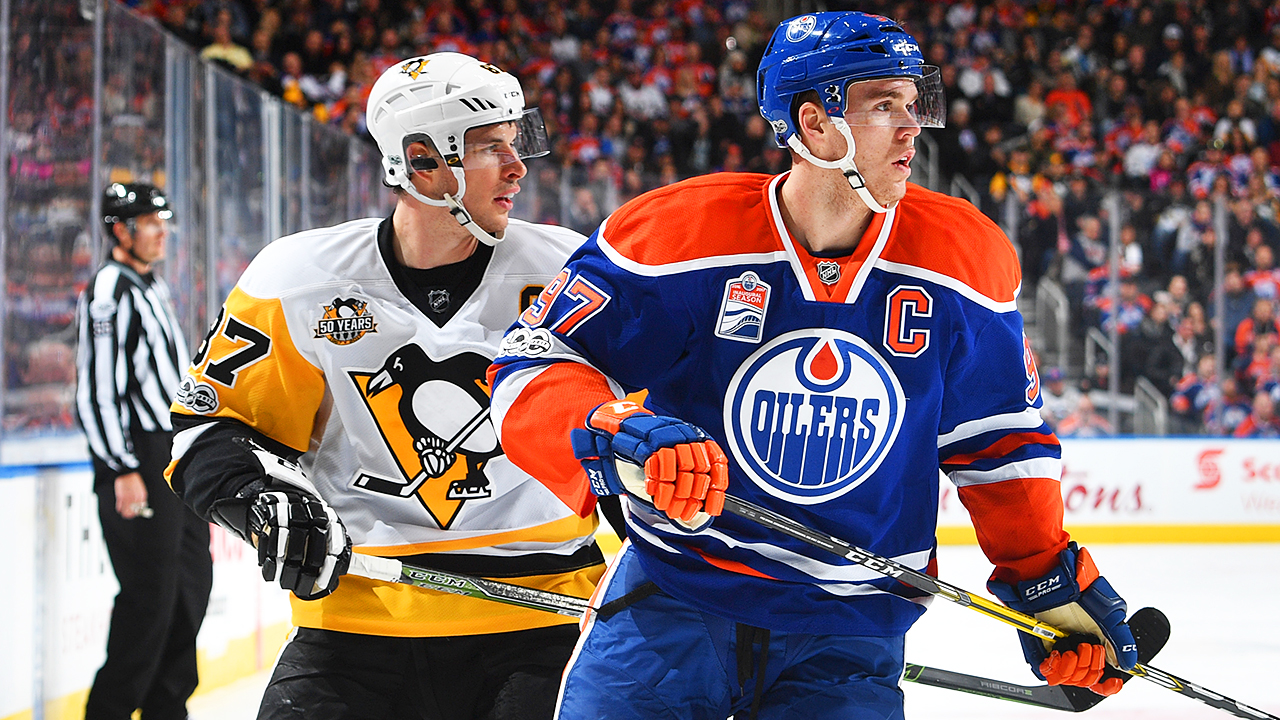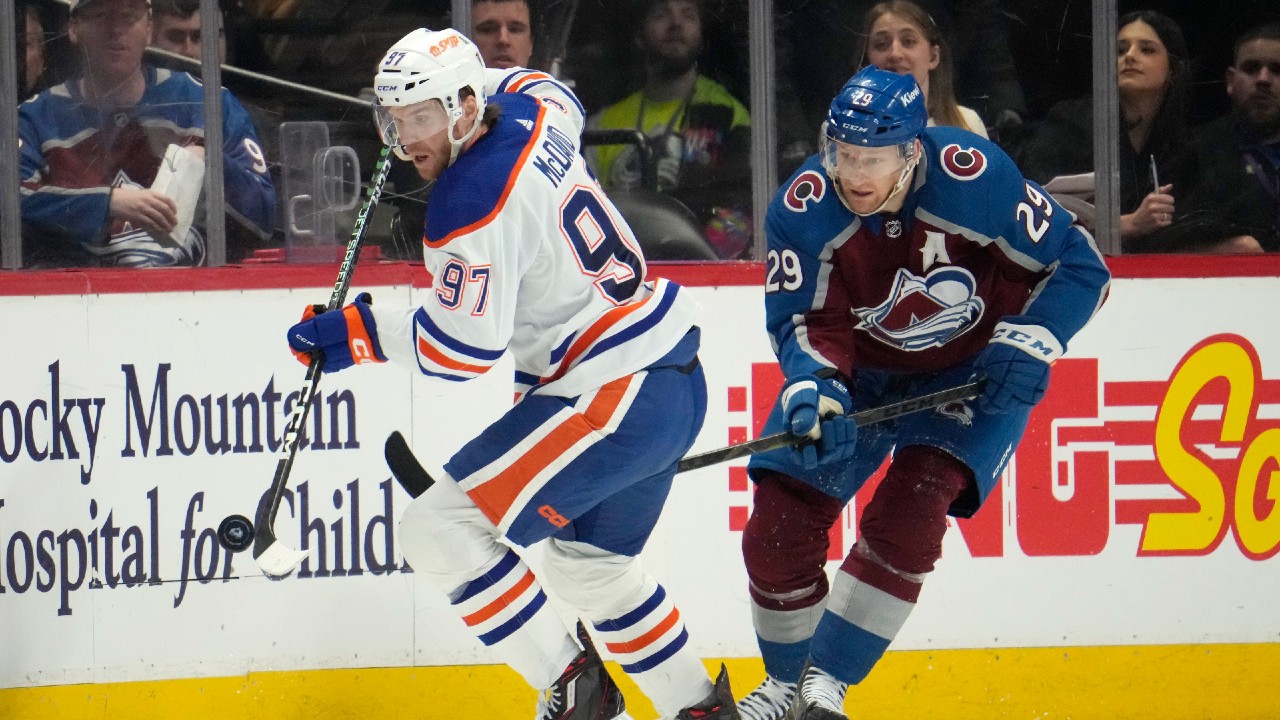
“It’s a waste of time, but I do one a year.” — an NHL scout, asked if he files a detailed report on Connor McDavid when scouting Edmonton.
EDMONTON — Connor McDavid would have done this long ago — last season, likely — had he not missed nearly half his rookie season with a broken collarbone.
Truly, there is only one surprising detail about McDavid scoring his 500th NHL point, very likely on Wednesday night versus the Winnipeg Jets. That is, he would accomplish the feat in 369 games — exactly the same number of games it took Sidney Crosby to score 500 points.
“That’s pretty cool. A guy I grew up watching,” said McDavid, who sits at 499 career points through his first 368 games played. “He’s done a couple of other things that I am trying to do, with all of his Cups and stuff. That stuff is more important, but if (500) happens, great.”
And those scouts? They watch him play, just as they watch Crosby. But they know their GM has no shot at acquiring them.
“I just tick off the box, ‘Franchise player,’” said another scout. “Same with Draisaitl. My report is, ‘Get ’em if you can.’”
Crosby and McDavid have been linked since the day McDavid was granted exceptional player status by the Ontario Hockey League at age 15. Now, being part of a Stanley Cup contender/winner, the availability of a Canadian Olympic team to star on, and 776 NHL points are what separates the two.
“He’s done everything I want to do — he’s a great guy to follow,” McDavid said of Crosby. “He’s done everything he has set his mind to: He wanted to get better on faceoffs, and he’s done that; he wanted to score more goals, and he did that.
“There’s lots of lessons from his game, because his game has changed over the years. He does whatever he can to be successful. He’s solid defensively.”
So as we mark an early milestone, let’s look at who McDavid has become in our game, beyond an author of at least one jaw-dropping, highlight play per month.
He is, for starters, the best player in the game with no caveats. Without adding “the player you’d want in Game 7 of the Cup Final,” or “the guy you want on the ice in the final minutes with a 3-2 lead,” through a 60-minute game and an 82-game season McDavid is simply the best hockey player in the sport today.
The best way to frame it is, if you could pick any player to start your team around, who would it be?
Is there even a second answer out there?
Not if you ask Wayne Gretzky.
“I’m one of the fans who says, every time he touches the puck, ‘OK, something special’s going to happen. Pay attention,’” Gretzky said.
And McDavid will get to those other categories eventually, ticking off those few remaining boxes in which Crosby still leads or contends. For now though, he is the fastest player on earth — with or without the puck — the most dynamic offensive player in the game, and undoubtedly the one player who is worth the price of admission more often than any other.
Since joining the league for the 2015-16 season, McDavid’s 499 points in 368 games is tops. Patrick Kane is next, with 487 points in 414 games, followed by Nikita Kucherov and Draisaitl.
All those players produce highlights. McDavid, meanwhile, makes a play on Toronto’s Morgan Rielly that will live on as long as the two play — and beyond.
Many players come back from injury and make a splashy return. At age 19, McDavid returned from three months on injured reserve to do this to the Columbus Blue Jackets — in only his 14th NHL game. He had three points that night.
One night against Tampa, Chris Kunitz kicked McDavid’s fourth goal of the night into his own net. Kunitz, who spent considerable time on Crosby’s flank in Pittsburgh, just shook his tuque.
“I guess you score one of his goals, it’ll be a good story to tell one day,” he reasoned.
We asked him that night about similarities, and to his discredit Kunitz did not predict the symmetry of their 500th point.
“It’s they’re competitiveness. They want to go through guys,” Kunitz said. “They want to be the best every single time they step on the ice. They’re driven by more than just wins and points. They’re driven by how they can change the game, or maybe it’s the individual status of trying to be the best that’s ever played the game.
“They don’t have a fear button. They don’t go wide on guys — they take it right through the middle. They enjoy the contact, almost,” he marveled. “You just want to get them the puck as quick as you can. You just give it to him with time to skate with it.”
The personal goals are changing now, as McDavid passes his 24th birthday just over a month ago with two Art Ross Trophies, two Ted Lindsay Awards, and a Hart Trophy all piled in his trophy case. He’s talking about a “200-foot game” more often now, and his faceoff work belies a summer spent working on an area of his craft that does not produce top-10 highlights.
He is that player who has outgrown simply working on the areas of the game he is already good at. Now he realizes that there isn’t as much room for improvement in those places where he already excels, as can be found in the few areas of the game where is lacking.
“He’s going to get a whole lot more points than 500,” said teammate Adam Larsson. “For him to reach that at this point, it is beyond impressive.
“The way he carries himself, the way he handles everything … He’s quite an impressive human being. Being 24 and having 500 points already? It’s remarkable.”
Meanwhile, though you may have a hard time spotting it, McDavid is making progress under the glare of the spotlight that has shone on him since age 14. With the media, he puts more thought into his answers now, and slowly the voice that carries so much weight in the hockey world is beginning to define itself — slowly.
McDavid is the “Face of the Game,” whether he wants to be or not. Now he’s starting to give the media something to work with, even if it seldom shows on those pesky “walk-off” interviews between periods.
And perhaps eventually, he’ll get better at talking himself up. Because a podium, a microphone, and a question about his own prowess remains the one place in a hockey rink where Connor McDavid is still truly uncomfortable.
“That’s the leadership he shows,” observes his head coach, Dave Tippett. “He is an incredible player, and the players that play with him are always amazed at what he does in the games. To be that humble, as a teammate you respect a guy for his leadership, his ability, but ultimately you respect him as a human being.
“Because he’s a really good person. It just so happens he’s (also) a really good hockey player.”




